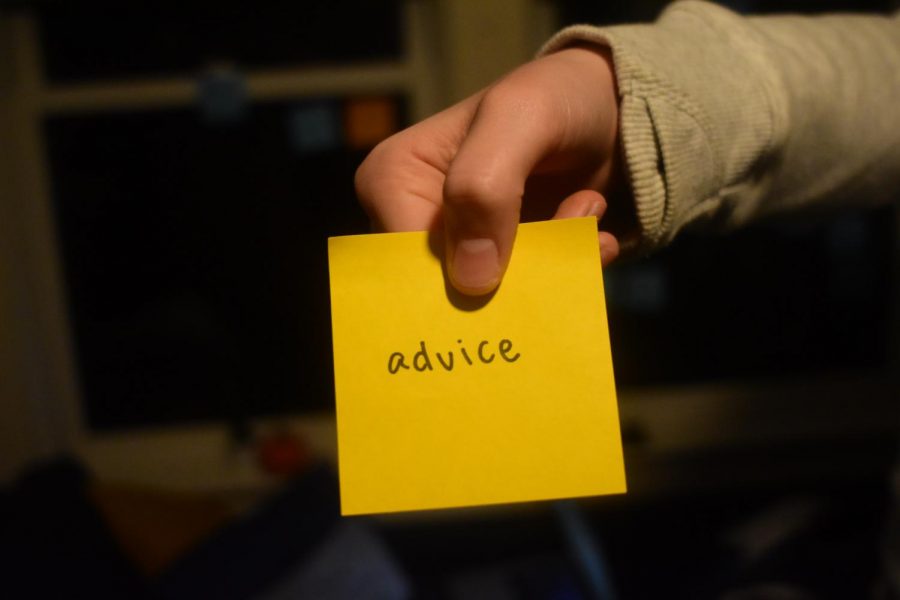Making Connections, Challenging Yourself, And Staying Organized: Seniors Share Advice For Underclassmen
Entering high school is challenging enough during a normal school year. As this school year kicks off in a digital setting, many seniors have tips for success to share with underclassmen.
October 28, 2020
The transition from middle school to high school is never an easy endeavor, but in the midst of one of the most devastating pandemics in recent history, this adjustment has been especially difficult for many freshmen.
Additionally, moving to a private school can be intimidating for those who are making the change alone. While this challenge couples up with the obstacles of online learning, it can be hard to establish a strong foundation as an underclassman in the first years of high school.
Although the school year has already commenced and many students have found the routine that works for them, several of the seniors have some advice for underclassmen to promote an entertaining and fruitful high school experience.
One senior, Ben Scott-Lewis, feels that the connection to teachers is essential to academic success and growing your network of support in your school community. “Without actually knowing your teachers you’re not as good at learning from them, so on the academic side you’re losing out,” Scott-Lewis said. “Some teachers can actually be your friends and part of your support system.”
Many seniors said that reaching out is a great way to build rapport and increase your chances of having a successful year.
Senior Freddie Buckman said that once you have a “friendly relationship [it] makes… it easier for [teachers] to help and teach you because they know how you learn, they know where your strong points are and where your weak points are.”
Alyna Nguyen, who is also a senior, agrees that the interactions students have with their teachers is paramount to their success. “[Teachers and staff are] there because they want to help you and make you a better student, so I would tell [underclassmen] to really take advantage of those opportunities and relationships they have with teachers,” Nguyen said.
Nataly Ramirez found support from her counselor when she was struggling to balance her coursework and extracurriculars as an underclassmen. “My counselor [was a] really big advocate for me my sophomore year,” Ramirez said. “I was playing varsity [tennis], and it was really hard for me to keep up with all my honors classes and just keeping up with my schedule, but she advocated for me [with] my teachers… and we made a schedule that worked for [me].”
Some seniors say developing as a student is challenging when you enroll in classes that don’t challenge you. Senior Izzy Sprando said that allowing yourself to face obstacles in your education and finding ways to overcome them helps you thrive as a student. “If you are uncomfortable, then that means you have so many opportunities to grow,” Sprando said.
Nguyen agrees that reaching outside your sanctuary of understanding is the key to becoming a responsible and independent student. “I think that’s the whole point of going to La Salle, making sure to push your limits because I feel that’s how you really improve as a student,” Nguyen said. “You really grow as an individual and as a learner when you challenge yourself in the classroom.”
In addition, seniors emphasized that colleges like to see students that are proactive with their education and are willing to take on challenging curriculums. “I would say [taking difficult classes is] important because, if [underclassmen] keep taking the easy way out and [take] easy classes all the time, then it’s not really helping them for their future,” Ryan Rosumny said. “At some point, they’re going to have to challenge themselves so I’d say it’s good to start early so that way you’re acclimated to that type of situation when you need to be.”
Some seniors also said that teachers in high school and college are not responsible for your engagement in the class or on assignments. Upperclassmen said it’s crucial to develop productive studying habits early to ensure assignments are completed well and on time.
“I just write down a checklist every day of what I need to get done,” Rosumny said. “I need to check off each box before the day is over, so I’ll put all my homework on there […] and then I’ll put all my tests on there so I know to prepare for them. That’s helped me because before I was forgetting about assignments and then not doing them.”
For Robert Reiss, being able to see his progress throughout the day helps motivate him. “I like when I can check things off, so I got a white board on Amazon, and I just write up all the things that I have to do in a given day on there,” Reiss said. “It’s really satisfying for me to get the whole board cleared off so that motivates me to get through it.”
Some seniors stressed that attentiveness in class and the ability to take good notes are both essential to consuming as much information as possible and applying it effectively. “Pay attention, write notes down, and ask any question you have,” Buckman said. “It’s so much easier for you to learn if you actually ask questions, [rather] than if you keep your pride and just stick through it.”
The students The Falconer spoke with unanimously said that participating in one of La Salle’s numerous clubs and athletic teams is a great way to involve yourself in the school’s devoted community. “My freshman year I joined choir, and I was kind of hesitant going in, but it is a really cool community, you meet a lot of different new people,” Reiss said. “It’s a really good way to make friends, especially for me, because I came into La Salle knowing maybe one or two people.”
Several seniors also said engaging in extracurriculars establishes friendships and provides outlets to express yourself outside of a classroom setting. “Especially during sports season it’s a nice break from schoolwork and it helps me kind of refresh my mind and get ready for more schoolwork, and it’s a nice way to have some social time as well,” Molly Jenne said.
Jenne and other seniors agreed that having an activity you enjoy outside of school can be extremely beneficial to your engagement in the classroom environment. “You kind of need that built-in break to do something creative or to do sports or whatever it is that you’re into, in order to get back to school and be able to focus more,” Grace Winningham said.
Ellen Dierckes also feels that extracurriculars provide the structure she needs to be productive. “In the spring, when nothing was happening, I had a hard time keeping up with my schoolwork because I had no incentive,” Dierckes said. “I think it’s good for me to have these extracurriculars where I can interact with my peers, not in an academic setting, and then that allows me to focus better with school.”
In closing, Jenne shared some general advice for success at La Salle.
“Don’t overcommit yourself,” Jenne said. “If you really just focused on a few things that you really do like what you put into it is what you’ll get out of it and you’ll have a better experience.”






Rejina Injety • Oct 6, 2024 at 10:31 am
Thanks for talking to so many upper class students and providing a variety of solid information for students that may not know many people at LaSalle. This is, honestly, the kind of advice that will help students in any academic endeavor moving forward, in college and careers too. Gaining comfort with asking questions and getting to know teachers/professors is huge. Great job.